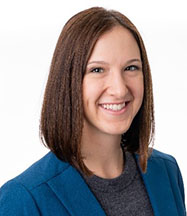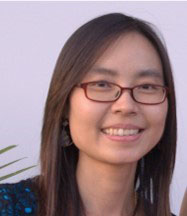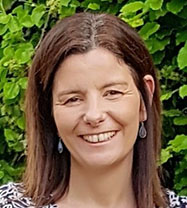BD engineers are at the forefront of our efforts toward advancing the world of health by improving discovery, diagnostics, and the delivery of care. In addition, they’re driving our inclusion and diversity (I&D) efforts by creating a more open and inclusive workplace so that all associates can reach their full potential.
In honor of International Women in Engineering Day, organized by the Women's Engineering Society, we asked a few of our own “Engineering Heroes” to share thoughts on their career journeys, how women engineers at BD are advancing healthcare and improving patient care and what it means to be working in healthcare, in addition to advice for future innovators in med tech.
Tell us about your career journey and why you pursued a career in engineering.
Beth Lorden, Associate Director, R&D Global Business Operations, United States: I earned my Ph.D. from Duke University in Biomedical Engineering and returned to BD as a member of the Technology Leadership Development Program (TLDP).  This research and development (R&D)-focused rotational program enabled me to explore a breadth of roles in industry early in my career. I became a biomedical engineer with a very focused goal: develop load-bearing cartilage. As a child I had surgery on my ankle to fix a joint abnormality and now live with fat between one of my joints rather than cartilage. At a young age, I focused on that problem as my life goal. It wasn’t until I entered graduate school that I began to realize I was excited and technically challenged by so many more problems than just cartilage. When I joined BD, I was amazed to find that I enjoyed working with software development teams and designing complex electro-mechanical devices. It is now my goal to find out what else inspires and drives me.
This research and development (R&D)-focused rotational program enabled me to explore a breadth of roles in industry early in my career. I became a biomedical engineer with a very focused goal: develop load-bearing cartilage. As a child I had surgery on my ankle to fix a joint abnormality and now live with fat between one of my joints rather than cartilage. At a young age, I focused on that problem as my life goal. It wasn’t until I entered graduate school that I began to realize I was excited and technically challenged by so many more problems than just cartilage. When I joined BD, I was amazed to find that I enjoyed working with software development teams and designing complex electro-mechanical devices. It is now my goal to find out what else inspires and drives me.
Linda Kunardi, R&D Staff Engineer, Singapore: I aspired to pursue a career in engineering because since young, I enjoy working on solving technical problems.  It brought me a sense of fulfilment each time I was able to resolve a complex engineering challenge. As a woman engineer, I was also motivated to contribute and excel in this predominantly male profession. I obtained my Bachelor’s and Master’s engineering degrees from the National University of Singapore. My Master’s research was on synthetic polymer-collagen composite hydrogel for drug delivery and tissue engineering. After graduation, I worked as a research engineer in the Institute of Material Research and Engineering, Singapore and a senior research engineer in the Singapore Institute of Manufacturing Technology before joining BD in 2014.
It brought me a sense of fulfilment each time I was able to resolve a complex engineering challenge. As a woman engineer, I was also motivated to contribute and excel in this predominantly male profession. I obtained my Bachelor’s and Master’s engineering degrees from the National University of Singapore. My Master’s research was on synthetic polymer-collagen composite hydrogel for drug delivery and tissue engineering. After graduation, I worked as a research engineer in the Institute of Material Research and Engineering, Singapore and a senior research engineer in the Singapore Institute of Manufacturing Technology before joining BD in 2014.
Nicola Carr, Senior Manager, Product Engineer, Ireland: My passion for math, engineering and biology started at an early age.  I wrote my first software program on a ZX Spectrum computer in the late 80s. I enjoyed the problem-solving aspect of software engineering. I achieved my Bachelor’s degree in computer engineering and my Master’s degree in Telecommunications Engineering from the University of Limerick. My first job after graduation was developing a Bluetooth stack for use in vehicles. I moved from the telecommunications industry into the financial industry and also transitioned into an engineering manager role. This role allowed me to mentor and support other engineers and have a greater impact on delivery of high-quality products. Moving to the medical devices industry two years ago allowed me to incorporate my love of biology and medicine, and allows me to feel like I am making a positive impact to society by helping to advance the world of health. I love the sense of accomplishment associated with releasing products into the market that use engineering to solve complex real-world problems.
I wrote my first software program on a ZX Spectrum computer in the late 80s. I enjoyed the problem-solving aspect of software engineering. I achieved my Bachelor’s degree in computer engineering and my Master’s degree in Telecommunications Engineering from the University of Limerick. My first job after graduation was developing a Bluetooth stack for use in vehicles. I moved from the telecommunications industry into the financial industry and also transitioned into an engineering manager role. This role allowed me to mentor and support other engineers and have a greater impact on delivery of high-quality products. Moving to the medical devices industry two years ago allowed me to incorporate my love of biology and medicine, and allows me to feel like I am making a positive impact to society by helping to advance the world of health. I love the sense of accomplishment associated with releasing products into the market that use engineering to solve complex real-world problems.
What are your current responsibilities and what have you found most rewarding?
Lorden: I’m now an Associate Director, R&D Global Business Operations, based at our BD Technology & Innovations site in Research Triangle Park, NC. I’m responsible for leading and managing key productivity, efficiency, technology transfer, and integration programs to ensure effective and efficient execution of BD’s global R&D strategic initiatives. I also co-lead a global technology scouting initiative focused on identifying early stage, potentially disruptive technology relevant to our innovation pipeline. I really enjoy the process of designing, building, testing and launching products. Part of what I love about BD is the breadth of our product portfolio; for example, in my current role I support products spanning disposables, home-care devices, hospital-grade electromechanical devices and combination drug-device implantable products.
Kunardi: As a Staff Engineer in BD Greater Asia R&D based in Singapore, I’m responsible for leading the design and development of new IV catheter products. Over the past seven years in BD, I have worked on new product developments that were launched in Asia, Europe, EMA and USA. To me, the most rewarding experience working in BD is the opportunity to make a difference to people’s lives. Knowing that there is a patient at the end of everything we do, I am more resolute in my commitment towards innovating products that address the needs of the clinicians and patients.
Carr: I am a R&D engineering manager in the Integrated Diagnostic Solutions (IDS) business unit within BD Life Sciences. My team consists of software developers, software testers, system engineers, and project managers in areas such as the instruments used for cervical cancer screening and HPV testing, and a molecular testing instrument that tests for COVID-19 among other diseases. I love the fact that each day brings a new challenge, and every day is different, and that I never stop learning on the job.
Why is gender equality in engineering roles important and what can others do to foster inclusion?
Lorden: As a society we have historical artifacts in many career fields. As a female engineer, I am working to shift the gender paradigm in the same way as my husband is as a male nurse. As the daughter of a female engineer, I know my mom’s generation made amazing progress in increasing the number of women entering STEM (science, technology, engineering, and mathematics). I think my generation’s call is to action is to improve the inclusion of diverse voices once they make it to the table. People can foster inclusion by bringing their whole selves to work and seeing each other as humans – not just employees. When considering a diverse team, the sum of our differences is smaller than the number of things we share; for example, the importance of family, friends, pets, hobbies, etc. Building relationships and showing respect for the input of others delivers tremendous impact to fostering a sense of belonging and inclusion. At BD, our mission is to advance the world of health, and I sincerely believe that will be most effectively achieved by an inclusive team with a diverse set of backgrounds.
Kunardi: I believe that women have the same capabilities as men to help advance engineering for the betterment of our society, hence they should be given more opportunities to flourish in the engineering profession. We need to encourage more women leaders in engineering, as well as mentors and role models for future generations of female engineers. In Singapore, based on a recent government survey, the proportion of women pursuing degrees in STEM has been increasing. However, only 30% of local researchers and engineers are women. The main reason for this is largely family obligations, along with family-unfriendly work environments and marginalization. As a mother, I am happy that BD has been very supportive and provided me with an environment where I can do my best both at work and in my family.
Carr: Imagine you are a female patient going in for a breast biopsy, the biopsy instrument is being operated by a male, and was designed and built by males. Afterward, you get contacted by a male product owner to give you feedback on the instrument, asking you questions that were thought of by men. Of course, the questions being asked may be the correct questions and the analysis of the responses and interpretation of the data may be done perfectly, but this fictional example is plausible and highlights how diversity of ideas may allow for better innovation and enhance our ability meet our customer needs. Fostering inclusion is something that every one of us is responsible for at every level and in every interaction. The best way to do this is to listen to the voice of others.
What advice do you have for others interested in engineering careers within the medical technologies field?
Lorden: My biggest piece of advice is don’t constrain yourself based on preconceived notions of what you think your technical background will allow you to do; rather, bring your full self to work and let your soft skills expand your impact. You’ve spent years educating yourself, which means you know how to learn. Take that skill set and apply it to learning new things. You’ll be amazed at what’s out there and the variety of challenges you can solve!
Kunardi: My advice would be that if you are truly passionate about engineering and want to pursue a career in medical device industry, then do not hold back. Give it a try! You will not regret; it will be both an enriching and fulfilling experience. Continue to develop your potential and learn new things. Transferable skills such as problem solving, analytical reasoning and critical thinking will bring you further in your career advancement.
Carr: Look for others around you that will support you and mentor you. You will find many people throughout your career that will be willing and glad to help you. Don’t be afraid to seek them out and ask for their help and advice, but always go your own way with courage and conviction.
Subscribe to receive BD blog alerts